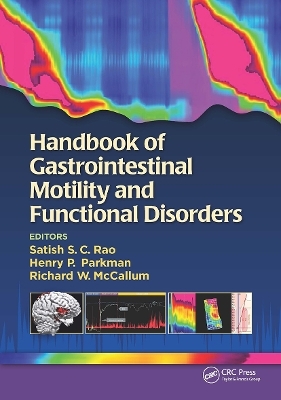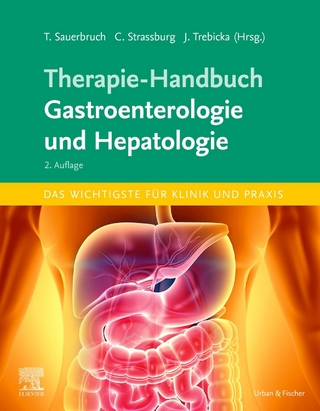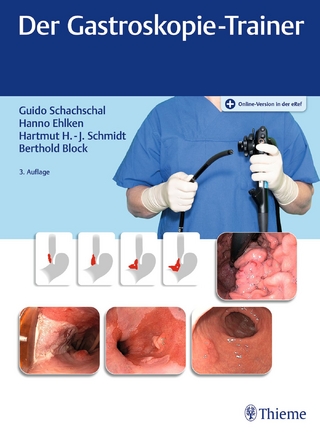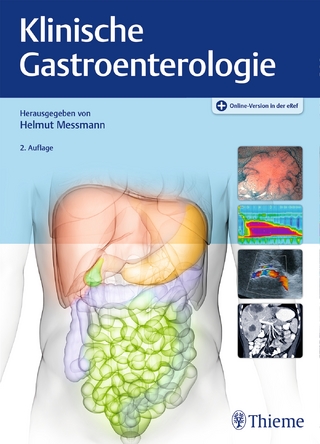
Handbook of Gastrointestinal Motility and Functional Disorders
SLACK Incorporated (Verlag)
978-1-61711-818-0 (ISBN)
The chapters are enriched with algorithms, tables, and figures to enhance learning and readability. Each chapter follows a specific outline; chapters on symptoms follow the format of definition, pathophysiology, and evaluation of the symptoms, whereas the chapters on specific disorders follow the format of definition, diagnosis, and treatment. This allows for quick reading of the various chapters and to gain up-to-date knowledge of the topic.
Each chapter also includes extensive color pictures and illustrations of each test involved and descriptions of how to perform and interpret the motility tests that are incorporated into patient care decisions.
Handbook of Gastrointestinal Motility and Functional Disorders by Drs. Satish S. C. Rao, Henry P. Parkman, and Richard W. McCallum will be useful for practicing physicians, junior academicians, GI fellows, young faculty, motility laboratory personnel, surgeons, internists, physician assistants, family practitioners, and nurse practitioners who all encounter the common problems of dysphagia, heartburn, nausea, vomiting, abdominal pain, irritable bowel syndrome, constipation, and fecal incontinence in their daily practice.
The update on management and therapy completes the Handbook of Gastrointestinal Motility and Functional Disorders and explains how to integrate this diagnostic information into decision making, and how to translate this to day-to-day patient care.
Satish S.C. Rao, MD, PhD, FRCP graduated from Osmania Medical College in Hyderabad, India. Subsequently, he completed his graduate medical education and GI Fellowship and Clinical Research training at several UK hospitals, notably Royal Hallamshire Hospital, Sheffield, and Royal Liverpool Hospitals before becoming a Fellow of the Royal College of Physicians in London. He earned his PhD from the University of Sheffield in the United Kingdom. He joined the faculty at the University of Iowa in 1991 where he participated in many National Institutes of Health (NIH)–funded research projects and cofounded the Pelvic Floor Group. In 2011, Dr. Rao was recruited to the Medical College of Georgia, Georgia Regents University, Augusta, Georgia, to serve as professor of medicine, chief of the Section of Gastroenterology/Hepatology, and the new founding director of the Digestive Health Center and the GI Service Line. In this role, he is leading an aggressive initiative to expand the university’s capabilities in treating digestive disorders that includes a brand-new Digestive Health Center and a state-of-the-art, 5-room neurogastroenterology and motility suite. He plans to work closely with colleagues in surgery, urology, otolaryngology, and neurology to create a model system of interdisciplinary care for GI motility patients. Dr. Rao is past president of the American Neurogastroenterology and Motility Society. He received the 3 highest honors from the American Gastroenterological Association: the Distinguished Clinician Award, the Masters Award for Outstanding Clinical Research, and the Distinguished Educator Award. He received the Auxiliary Research Award from the American College of Gastroenterology and several international awards for his research and teaching. He serves on the editorial board of several journals, is cochair of AGA Council on Neurogastroentrology and GI Motility, has published over 300 articles, and has edited 5 books on GI motility. Henry P. Parkman, MD joined the faculty of Temple University School of Medicine in 1990, and has been actively involved in studying GI motility at both the basic science and clinical levels. His clinical focus has been treating patients with GI motility disorders, primarily gastroparesis. Clinically at Temple, Dr. Parkman is in charge of the GI Motility Laboratory that assesses GI motility dysfunction in patients. His clinical laboratory has developed expertise in a comprehensive array of GI motility tests for clinical evaluation of patients, including specialized tests of esophageal and gastric motility. This is a referral center for the evaluation and treatment of GI motility disorders. Dr. Parkman was funded for 10 years with an NIH K24 Midcareer Investigator Award in Patient-Oriented Research entitled “Novel Evaluation & Treatment of Gastric Dysmotility,” which, in addition to funding research in gastric motility, provided time for him to mentor young investigators in clinical research. Through this research, studies were performed on novel ways to assess gastric emptying. Dr. Parkman is currently a funded member of the NIH Gastroparesis Clinical Research Consortium, now in its second 5-year cycle, established by the NIDDK to enhance the understanding of gastroparesis. This research has better defined the syndromes of diabetic and idiopathic gastroparesis, and the consortium is now conducting clinical trials to help better treat patients with their refractory symptoms of nausea and vomiting. His manuscript on the use of nortriptyline for nausea and abdominal pain in gastroparesis recently appeared in JAMA. He is currently studying the neurokinin receptor antagonist aprepitant as a treatment for the nausea and vomiting seen in gastroparesis. During his presidency of the American Neurogastroenterological and Motility Society, Dr. Parkman helped standardize the radionuclide gastric emptying study and make it a more standardized test that can be done at different institutions in a uniform fashion. He remains active with an initiative to develop a patient-reported outcome (PRO) for gastroparesis that meets the approval of the Food and Drug Administration (FDA). This would help ease the study of treatments for gastroparesis, which are greatly needed. Richard W. McCallum, MD, FACP, FRACP (AUST), FACG, AGAF is professor and founding chairman of the Department of Internal Medicine, Texas Tech University Health Sciences Center at El Paso. Dr. McCallum also serves as director of the Center for Neurogastroenterology and GI Motility and Functional Bowel Disorders, a referral and research center for patients locally, regionally, and nationally. After completing his undergraduate studies at the University of Queensland, he earned his medical degree at the Queensland Medical School in Brisbane, Australia. Dr. McCallum completed gastroenterology fellowship training at the University of California in Los Angeles and Wadsworth VA Medical Center. He joined the faculty of Yale University School of Medicine in 1996. Dr. McCallum was professor of medicine chief and program director of the Division of Gastroenterology, Hepatology, and Nutrition at the University of Virginia School of Medicine, Charlottesville, Virginia, from 1985 to 1996, where he was awarded the Paul Janssen Endowed Chair and Professorship. From 1996 to 2004, Dr. McCallum was chief and program director, Division of Gastroenterology and Hepatology, University of Kansas Medical Center, Kansas City, and then became director of the Center for GI Nerve and Muscle Function and chief of Division of GI Motility, University of Kansas School of Medicine from 2004 to 2009 before being recruited as the founding chair of the new Paul L. Foster School of Medicine in El Paso in 2009. Among his professional honors and memberships are Fellow of the American College of Physicians, Fellow of the Royal Australiasian College of Physicians, Fellow of the American College of Gastroenterology, Fellow of the American Gastroenterology Association, member of the American Society for Clinical Investigation, President and Founders Medal Recipient of the Southern Society for Clinical Investigation, Moreton Award for Original Research in Medicine, and the CURE Award for Diabetes Research, and the Chancellor’s Distinguished Research Award at Texas Tech University. He is currently President of the International Gastrointestinal Electrophysiology Society. Dr. McCallum’s area of clinical interest and research is the field of GI motility, neurogastroenterology, and functional bowel disorders. He has been focused on advancing knowledge related to pathophysiology, diagnostic approaches, pharmacology, and device technology. He is a pioneer in the area of gut electrophysiology and developed the concept of electrical “pacing” of the stomach to treat gastroparesis and nausea and vomiting, particularly related to diabetes mellitus. Recently, he has contributed to major advances in understanding and management of cyclic vomiting syndrome in adults, “dumping syndrome,” and rumination syndrome and has potentially revolutionized the field of gastroparesis and functional dyspepsia by developing and reporting a new technique to nonsurgically obtain gastric smooth muscle tissue by endoscopic ultrasound biopsy. Dr. McCallum’s research has been funded by the American Diabetes Association VA Medical Centers and NIH. Currently, he is funded by the NIH Gastroparesis Clinical Research Consortium. Established by NIDDK and initiated in 2008, it has been renewed for a further 5 years. The program has developed the world’s largest database of gastroparesis patients and conducts cutting-edge basic translational and therapeutic research. Dr. McCallum was recently awarded funding from the International Foundation for Functional Gastrointestinal Diseases (IFFDG) to study a new therapy, transcutaneous electrical stimulation, in patients with nausea, vomiting, and idiopathic gastroparesis. He has published over 400 articles in peer-reviewed scientific journals, more than 100 chapters in textbooks, edited 15 textbooks, and has 3 active patents on GI therapies.
Dedication About the Editors Acknowledgments Contributing Authors Preface Foreword by Robert S. Fisher, MD Introduction Section I Esophageal Disorders Chapter 1 Esophageal Symptoms: Dysphagia, Heartburn, and Esophageal Chest PainMaria Samuel, MD and C. Prakash Gyawali, MD, MRCP Chapter 2 Gastroesophageal Reflux DiseaseWojciech Blonski, MD, PhD and Joel E. Richter, MD, FACP, MACG Chapter 3 AchalasiaAndrew J. Gawron, MD, PhD, MS and John E. Pandolfino, MD, MSCI Chapter 4 Esophageal Spasm and Hypercontractile and Hypertensive Motility DisordersMark R. Fox, MD, MA, FRCP and Rami Sweis, MD, PhD, MRCP Chapter 5 Cricopharyngeal DisordersKevin A. Ghassemi, MD and Jeffrey L. Conklin, MD Chapter 6 Esophageal HypersensitivityJose M. Remes-Troche, MD and Ronnie Fass, MD Section II Gastric Disorders Chapter 7 Symptoms of Gastric Dysmotility: Nausea, Vomiting, Abdominal Pain, Postprandial Fullness, and Early SatietyWilliam L. Hasler, MD Chapter 8 GastroparesisSameer Dhalla, MD, MHS and Pankaj Jay Pasricha, MD Chapter 9 Functional DyspepsiaJan Tack, MD, PhD Chapter 10 Dumping SyndromePatrick Berg, BS and Richard W. McCallum, MD, FACP, FRACP (AUST), FACG, AGAF Chapter 11 Cyclic Vomiting SyndromeThangam Venkatesan, MD and Erica A. Samuel, MD Chapter 12 Rumination SyndromeChad J. Cooper, MD; Joseph K. Sunny, Jr, MD; and Richard W. McCallum, MD, FACP, FRACP (AUST), FACG, AGAF Section III Small Intestinal Disorders Chapter 13 Small Intestinal Dysmotility Symptoms: Bloating, Distension, and GasJuan R. Malagelada, MD and Carolina Malagelada, PhD, MD Chapter 14 Chronic Intestinal Pseudo-obstructionRobert M. Siwiec, MD and John M. Wo, MD Chapter 15 Small Intestinal Bacterial OvergrowthBaha Moshiree, MD and Yehuda Ringel, MD, AGAF, FACG Chapter 16 Food Intolerance and Dietary Concepts in Functional Bowel DisordersAbimbola O. Aderinto-Adike, MD and Eamonn M.M. Quigley, MD, FRCP, FACP, FACG, FRCPI Section IV Colonic and Anorectal Disorders Chapter 17 Colonic Symptoms: Constipation, Diarrhea, and Fecal IncontinenceLawrence R. Schiller, MD Chapter 18 Irritable Bowel SyndromeElizabeth J. Videlock, MD and Lin Chang, MD Chapter 19 Slow Transit ConstipationRichard J. Saad, MD, MS Chapter 20 Dyssynergic Defecation and ConstipationGina Sam, MD, MPH and Satish S.C. Rao, MD, PhD, FRCP Chapter 21 Fecal IncontinenceWilliam E. Whitehead, PhD; Steve Heymen, PhD; and Giuseppe Chiarioni, MD Chapter 22 Anorectal Disorders: Fecal Impaction, Descending Perineum Syndrome, Rectocele, and Levator Ani SyndromeSatish S.C. Rao, MD, PhD, FRCP and Kulthep Rattanakovit, MD Chapter 23 Diabetes and the GutChristopher K. Rayner, MBBS, PhD, FRACP; Karen L. Jones, Dip App Sci (Nuc Med), PhD; and Michael Horowitz, MBBS, PhD, FRACP Chapter 24 Scleroderma and the GutDeborah M. Bethards, MD and Ann Ouyang, MD Chapter 25 Opiate-Induced Bowel DysfunctionEva Szigethy, MD, PhD; Marc Schwartz, MD; and Douglas A. Drossman, MD Financial Disclosures Index
| Erscheint lt. Verlag | 30.6.2015 |
|---|---|
| Sprache | englisch |
| Maße | 178 x 254 mm |
| Gewicht | 798 g |
| Themenwelt | Medizinische Fachgebiete ► Innere Medizin ► Gastroenterologie |
| ISBN-10 | 1-61711-818-4 / 1617118184 |
| ISBN-13 | 978-1-61711-818-0 / 9781617118180 |
| Zustand | Neuware |
| Haben Sie eine Frage zum Produkt? |
aus dem Bereich


